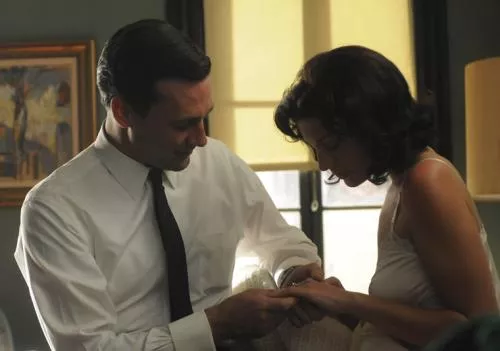Wednesday, October 20, 2010
Mad Men S4 Retrospective: Dapper Don and the Mystery of the Missing Mojo
Reviewing Mad Men presents a unique challenge. It isn’t a show about plot, it’s a show about character development and atmosphere. So we have to view — and judge — Mad Men in a different way than most plot-twist-heavy shows.
But looking back on Mad Men’s fourth season, we get perhaps the best season setup, with one of the weakest payoffs, in Mad Men’s history.
In the first half of the season, the descent of Don Draper was one of the strongest character developments Mad Men's ever had. We’ve been conditioned to, in a way, cheer for Don Draper’s distant mastery of cool. Despite his sleaziness, despite his psychological issues, despite his distance and artifice, Don was a man many men idealized: The master of bedroom and boardroom.
To paraphrase an old Mad Men joke : Don’s got 99 problems ... but a pitch ain't one.
To
see Don's collapsing marriage lead him into alcoholism and existential
crisis, to see the paint chipping away at his slick Draper veneer, felt
real. The character changed, but in a way that had already been
established. Take away his family — his anchor — and suddenly
Draper's adrift.
I
got into a mild argument with a friend who was convinced Draper’s drunken hookup with a secretary was yet another studly
conquest, not the actions of a desperate, pathetic creep. That’s how committed this friend was to the notion
of Don Draper as a model of masculine swagger. You don't believe this
cool and collected character could get so desperate and lonely. But the
seeds of his psychological collapse were always there.
Betty
Draper, however, remained a character who got worse and worse. She's
become a villain, but not a fun kind of villain like Prison Break's
T-Bag or one voiced by Jeremy Iron. Increasingly, she’s become a spoiled, childish shrew. I don’t see her gaining layers of personality. I don’t
see her getting more complicated. I see her few personality traits
becoming more exaggerated and pronounced. She’s one freak-out away from
being a character in this year’s sexist Super Bowl commercials.
This season also gave us trouble with the office’s reaction to the world evolving around it. It’s hard for a period drama to switch periods. We don’t want characters to change too much in between seasons — character development is something we need to see. And it feels odd if the sixties are happening outdoors, but inside Sterling Cooper Draper Price it’s the same old late ‘50s. But occasionally, it felt like the series was beating the “The Times They Are a-Changin'” drum a little too hard.
Mad Men is strongest when the time is something that’s simply understood as the foundational reality, not something we all point at and say “Look! Important events are happening!”
The end of this season included two crazy gambits from Don, one that makes sense and one that doesn’t. The first was classic Draper. After losing their biggest client — Lucky Strike — and with the agency on the brink of collapse, Don unilaterally takes out a large ad saying that his agency would no longer provide advertisements for cigarette companies. It was a risky gambit, but Don was in a no-win situation. He had to do something to change the conversation away from “Sterling Cooper Draper Price is in trouble.”
Predictably,
this made SCDP look even more doomed temporarily, but the payoff was ... well, there wasn’t much payoff at all. That was one problem with the
episode. All this doom and gloom begged for a fantastic solution.
Instead it turned out to be, well, Peggy bagged a $250,000 account
using the same sort of advertising techniques she’s been pitching all
throughout the show. To the SCDP drama, building all season, we get a
listless anticlimax.
And then there’s the massive "whaaaaat?” moment: Don Draper, who’s long been established as a player, a man who’s always been driving by “status” when it comes to relationships (even Betty Draper was a model), decides on a whim to marry his decently attractive secretary Megan? He’s mocked Roger Sterling for doing exactly that same thing before. Much of the Internet was convinced the whole thing was a dream sequence as it was happening.
Suddenly, the womanizer with an
atrophied soul becomes the sort of head-in-the-clouds romantic that
writes Don Plus Megan 4 ever in cursive with a glitter pen in his diary? The
cynic goes to Disneyland and starts acting as twitterpated as a princess in a Disney movie?
There is truth, sure, in
the axiom that a cynic is generally a failed romantic. But this is not
how Draper’s romanticism has cropped up: He’s a romantic of nostalgia,
a romantic of ambition and high standards, not a
met-a-nice-girl-and-now-we’re-going-to-the-chapel-and-we’re-gonna-get-maaaarrrieeed
romantic. He’s the type who harnesses that sort of romanticism, and
uses it to sell handbags.
It would make sense if this
was something Draper did just to feel something, anything; if this was
just another level in his collapse. But we don’t get a whiff of the
tailspin of desperation.
This isn’t how Needy Don acts. And this isn’t how Confident Don acts. This isn’t even how Dick Whitman acts. This is a new character entirely, a character marched out to make for a water-cooler-ready finale.
Obviously, a lot of
critics disagree with me. I’ll respect their love of this episode and
believe their appreciation was genuine. But sometimes I feel that,
because Mad Men is so respected, there’s a tendency to treat Mad Men characters like
a therapist might actually treat a real person. When a character does
something that doesn’t fit them, or if a character seems thinly drawn,
they psychoanalyze the character, grasping for reasons, rather than
blame the writing.
And sometimes I feel that Mad Men fans interpret Mad Men plots in same way the strongly religious interpret the events and tragedies in their own life. A plot or character development doesn’t make sense? It must be Matthew Weiner trying to send us a symbolic message. Showrunners, after all, work in mysterious ways.
Critic Cory Barker questions whether it’s come to the point where it’s not even possible to give a Mad Men episode a bad review.
It should be. Since Mad Men is a show, uniquely, about characters and atmosphere rather than plot developments. When characters fail to make decisions that fit who they’ve become (Don) or when a character’s arc is merely one shrill note played ever louder (Betty), we miss what makes Mad Men great.
Finale grade: C Plus
Season grade: B Plus
(Note: Grades are on the Mad Men scale, which differs substantially from the Jersey Shore scale.)
Tags: Television , AMC , Mad Men , TV , Image


















